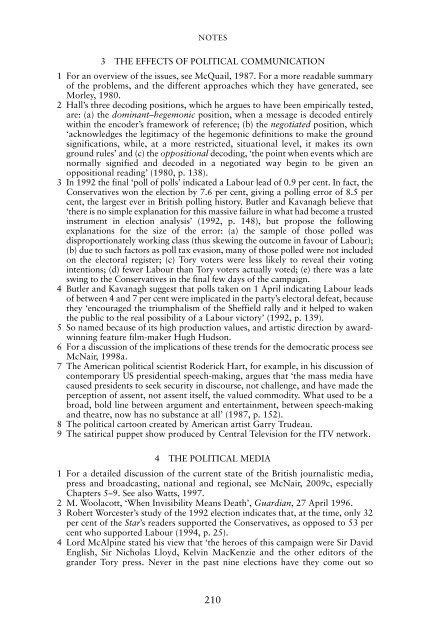20130412164339753295_book_an-introduction-to-political-communication
20130412164339753295_book_an-introduction-to-political-communication
20130412164339753295_book_an-introduction-to-political-communication
You also want an ePaper? Increase the reach of your titles
YUMPU automatically turns print PDFs into web optimized ePapers that Google loves.
NOTES<br />
3 THE EFFECTS OF POLITICAL COMMUNICATION<br />
1 For <strong>an</strong> overview of the issues, see McQuail, 1987. For a more readable summary<br />
of the problems, <strong>an</strong>d the different approaches which they have generated, see<br />
Morley, 1980.<br />
2 Hall’s three decoding positions, which he argues <strong>to</strong> have been empirically tested,<br />
are: (a) the domin<strong>an</strong>t–hegemonic position, when a message is decoded entirely<br />
within the encoder’s framework of reference; (b) the negotiated position, which<br />
‘acknowledges the legitimacy of the hegemonic definitions <strong>to</strong> make the ground<br />
significations, while, at a more restricted, situational level, it makes its own<br />
ground rules’ <strong>an</strong>d (c) the oppositional decoding, ‘the point when events which are<br />
normally signified <strong>an</strong>d decoded in a negotiated way begin <strong>to</strong> be given <strong>an</strong><br />
oppositional reading’ (1980, p. 138).<br />
3 In 1992 the final ‘poll of polls’ indicated a Labour lead of 0.9 per cent. In fact, the<br />
Conservatives won the election by 7.6 per cent, giving a polling error of 8.5 per<br />
cent, the largest ever in British polling his<strong>to</strong>ry. Butler <strong>an</strong>d Kav<strong>an</strong>agh believe that<br />
‘there is no simple expl<strong>an</strong>ation for this massive failure in what had become a trusted<br />
instrument in election <strong>an</strong>alysis’ (1992, p. 148), but propose the following<br />
expl<strong>an</strong>ations for the size of the error: (a) the sample of those polled was<br />
disproportionately working class (thus skewing the outcome in favour of Labour);<br />
(b) due <strong>to</strong> such fac<strong>to</strong>rs as poll tax evasion, m<strong>an</strong>y of those polled were not included<br />
on the elec<strong>to</strong>ral register; (c) Tory voters were less likely <strong>to</strong> reveal their voting<br />
intentions; (d) fewer Labour th<strong>an</strong> Tory voters actually voted; (e) there was a late<br />
swing <strong>to</strong> the Conservatives in the final few days of the campaign.<br />
4 Butler <strong>an</strong>d Kav<strong>an</strong>agh suggest that polls taken on 1 April indicating Labour leads<br />
of between 4 <strong>an</strong>d 7 per cent were implicated in the party’s elec<strong>to</strong>ral defeat, because<br />
they ‘encouraged the triumphalism of the Sheffield rally <strong>an</strong>d it helped <strong>to</strong> waken<br />
the public <strong>to</strong> the real possibility of a Labour vic<strong>to</strong>ry’ (1992, p. 139).<br />
5 So named because of its high production values, <strong>an</strong>d artistic direction by awardwinning<br />
feature film-maker Hugh Hudson.<br />
6 For a discussion of the implications of these trends for the democratic process see<br />
McNair, 1998a.<br />
7 The Americ<strong>an</strong> <strong>political</strong> scientist Roderick Hart, for example, in his discussion of<br />
contemporary US presidential speech-making, argues that ‘the mass media have<br />
caused presidents <strong>to</strong> seek security in discourse, not challenge, <strong>an</strong>d have made the<br />
perception of assent, not assent itself, the valued commodity. What used <strong>to</strong> be a<br />
broad, bold line between argument <strong>an</strong>d entertainment, between speech-making<br />
<strong>an</strong>d theatre, now has no subst<strong>an</strong>ce at all’ (1987, p. 152).<br />
8 The <strong>political</strong> car<strong>to</strong>on created by Americ<strong>an</strong> artist Garry Trudeau.<br />
9 The satirical puppet show produced by Central Television for the ITV network.<br />
4 THE POLITICAL MEDIA<br />
1 For a detailed discussion of the current state of the British journalistic media,<br />
press <strong>an</strong>d broadcasting, national <strong>an</strong>d regional, see McNair, 2009c, especially<br />
Chapters 5–9. See also Watts, 1997.<br />
2 M. Woolacott, ‘When Invisibility Me<strong>an</strong>s Death’, Guardi<strong>an</strong>, 27 April 1996.<br />
3 Robert Worcester’s study of the 1992 election indicates that, at the time, only 32<br />
per cent of the Star’s readers supported the Conservatives, as opposed <strong>to</strong> 53 per<br />
cent who supported Labour (1994, p. 25).<br />
4 Lord McAlpine stated his view that ‘the heroes of this campaign were Sir David<br />
English, Sir Nicholas Lloyd, Kelvin MacKenzie <strong>an</strong>d the other edi<strong>to</strong>rs of the<br />
gr<strong>an</strong>der Tory press. Never in the past nine elections have they come out so<br />
210
















